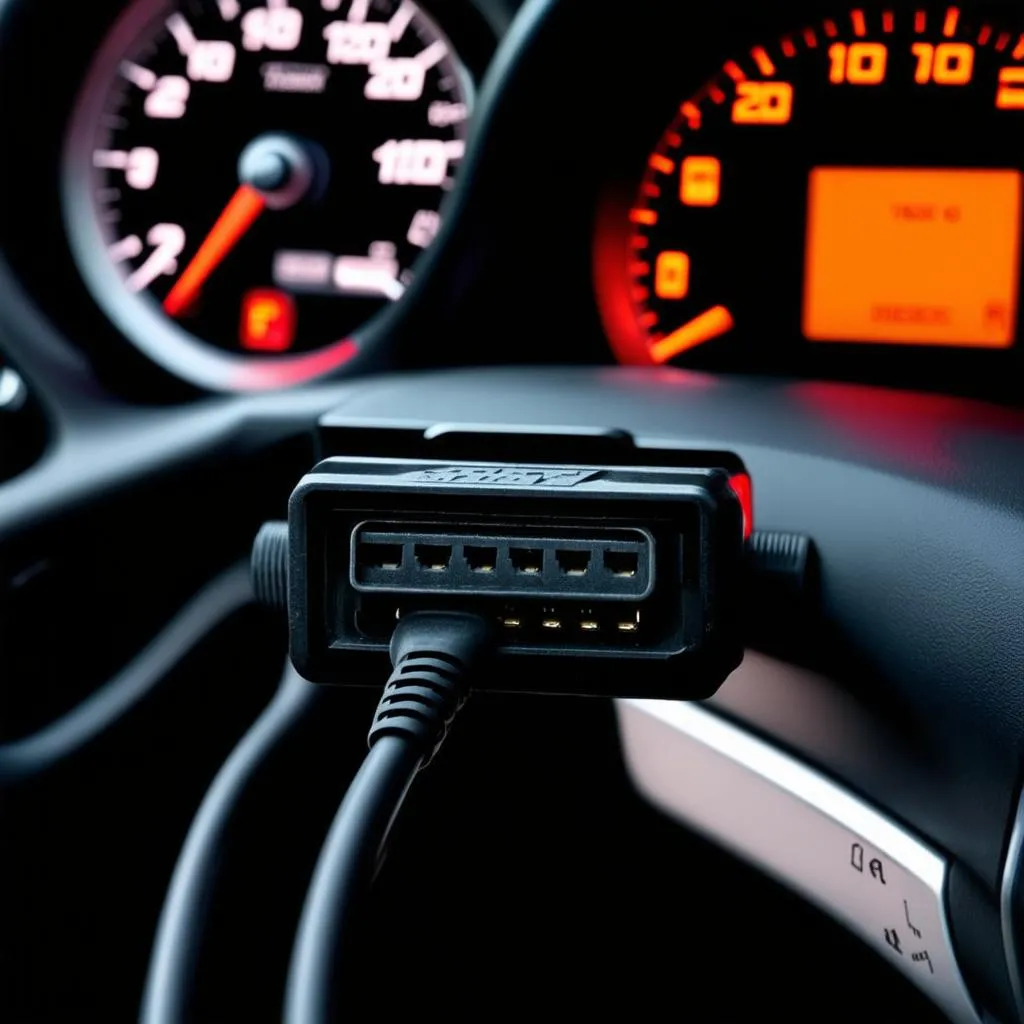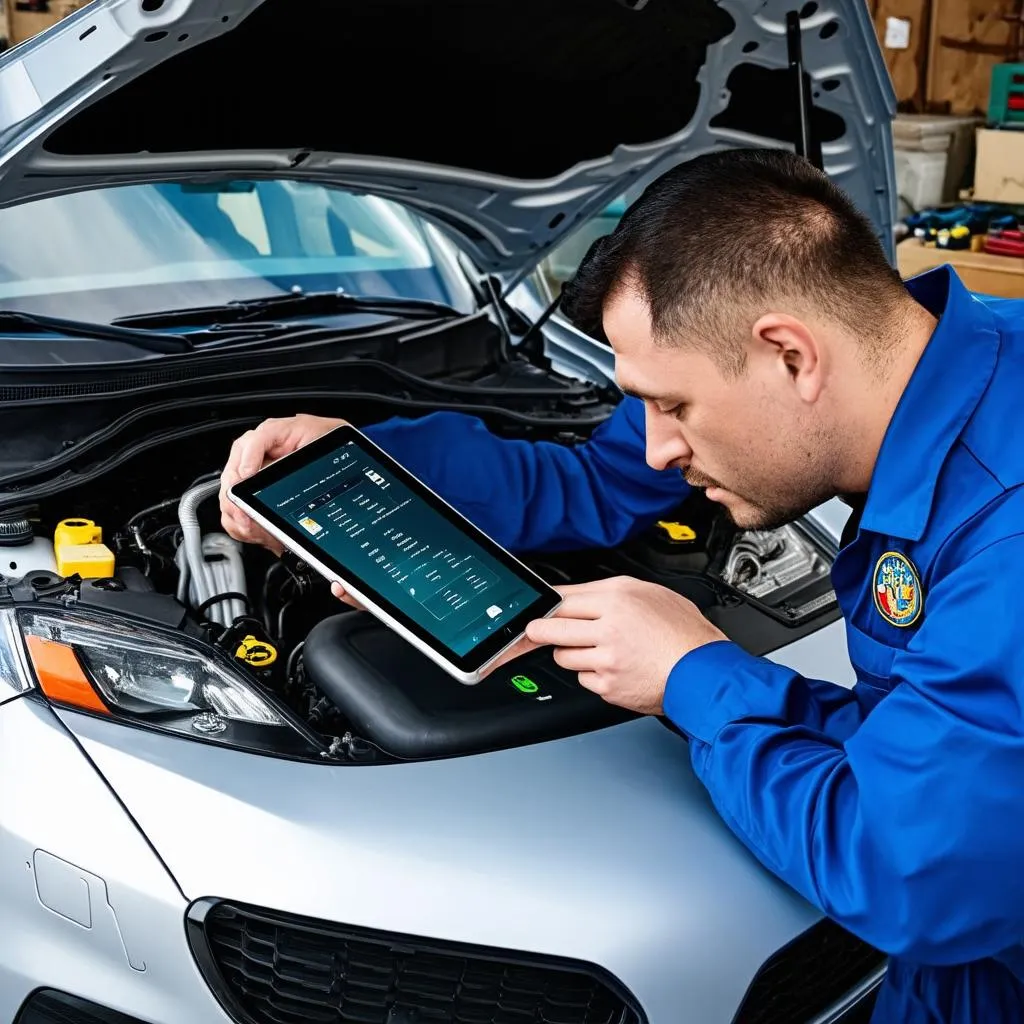“Check engine” light got you seeing red? Ever wish you could understand your car’s whispers before they become shouts? That’s where Diy Obd comes in. Think of it as learning your car’s secret language – without needing a Ph.D. in mechanics.
What is DIY OBD and Why Should I Care?
Imagine this: you’re cruising down the highway, windows down, your favorite tunes blasting…then, BAM! That dreaded “check engine” light flashes on. Your heart sinks. Is it something serious? Do you need to pull over right now? Or can it wait? DIY OBD empowers you to answer these questions yourself.
OBD, or On-Board Diagnostics, is like your car’s built-in computer system. It constantly monitors your engine and other critical components, storing diagnostic trouble codes (DTCs) when something seems off. DIY OBD simply means using an affordable OBD-II scanner, readily available online or at auto parts stores, to read these codes yourself.
Why DIY?
- Save Money: Skip those hefty mechanic diagnostic fees and pinpoint the problem yourself.
- Empowerment: Knowledge is power! Understand your car’s health and make informed decisions about repairs.
- Early Detection: Catch minor issues before they snowball into major (and expensive!) headaches.
Diving Deeper: Exploring the World of DIY OBD
Now that you’re intrigued, let’s unravel the mysteries of DIY OBD:
1. OBD-II Scanners: Your Gateway to Car Communication
OBD-II scanners are your Rosetta Stone for deciphering those cryptic DTCs. They come in various forms:
- Basic Code Readers: Affordable and easy to use, these display the error code, which you can then research online.
- Bluetooth Scanners: Connect to your smartphone or tablet for more detailed information and data logging capabilities.
- Advanced Scanners: Offer features like live data streaming, allowing you to monitor engine performance in real-time.
Choosing the right scanner depends on your budget and technical comfort level.
2. Unmasking Those Cryptic Codes: Understanding DTCs
Those jumbles of letters and numbers (like P0301) might seem like alien language, but they hold the key to understanding your car’s woes. Fortunately, numerous online resources can help you translate these codes into plain English.
Pro Tip: Always cross-reference DTCs with your car’s specific make and model for the most accurate diagnosis.
3. Beyond the Codes: Harnessing the Power of Data
Advanced OBD-II scanners can unlock a wealth of data about your car’s performance, including:
- Live Data: Monitor parameters like engine speed, coolant temperature, and oxygen sensor readings in real-time.
- Freeze Frame Data: Captures a snapshot of your engine’s performance at the moment a fault code was triggered.
- Emissions Readiness: Checks if your car’s emissions systems are functioning correctly.
This data can be invaluable for diagnosing intermittent issues or monitoring the health of your engine over time.
DIY OBD: A Word of Caution
While DIY OBD can be incredibly empowering, it’s essential to remember:
- Not a Magic Bullet: OBD-II scanners diagnose, not repair. You’ll still need mechanical expertise to fix the underlying issue.
- Misinterpretation is Possible: Always double-check DTC interpretations and seek professional help if unsure.
- Complexity Varies: Some car systems are more complex than others. Don’t hesitate to consult a mechanic for tricky diagnoses.
FAQs: Addressing Your DIY OBD Queries
Q: Will using an OBD-II scanner void my car’s warranty?
A: No, using a scanner won’t void your warranty. In fact, understanding your car’s health can help you address issues before they become major warranty claims.
Q: Can I use any OBD-II scanner on any car?
A: While most cars manufactured after 1996 are OBD-II compliant, certain European models might require specialized scanners.
Q: What are some common DIY OBD mistakes to avoid?
A: Rushing to conclusions without fully researching DTCs, ignoring potential underlying issues, and attempting repairs beyond your skill level are common pitfalls to avoid.
DIY OBD: Embracing the Future of Car Care
Just as technology has revolutionized healthcare, DIY OBD is transforming the way we interact with our cars. By embracing these powerful tools, you can become an informed car owner, saving money, and ensuring your vehicle stays healthy for miles to come.
 OBD Scanner Connected to Car
OBD Scanner Connected to Car
Remember, understanding your car shouldn’t be a black art. With DIY OBD, you hold the key to unlocking a world of knowledge and taking control of your car’s well-being.
Need Help? We’re Just a Message Away!
Feeling overwhelmed by the world of OBD-II scanners and diagnostic codes? Don’t worry, we’re here to help! Our team of expert auto technicians is available 24/7 to guide you through the process. Contact us on Whatsapp at +84767531508 for personalized assistance with:
- Choosing the right OBD-II scanner for your needs
- Interpreting diagnostic trouble codes
- Troubleshooting car problems
Let us empower you to become your car’s best mechanic!
 Mechanic Using Tablet to Diagnose Car
Mechanic Using Tablet to Diagnose Car
Want to explore more car maintenance tips and tricks? Check out our other informative articles on techcarusa.com!
Empower yourself with knowledge and keep your car running smoothly!
